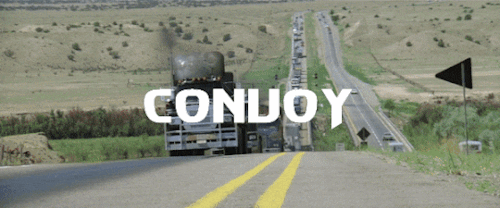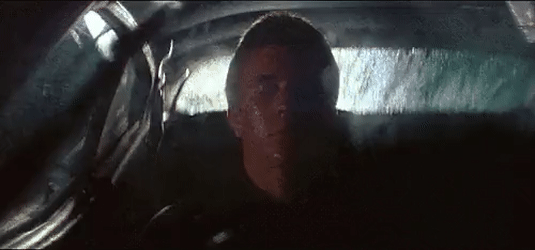CONVOY YOUR ENTHUSIASM (INTRO)
By:
July 31, 2019

Action movies, the tough, resourceful protagonists of which must run, jump, fight and kill in order to extricate themselves from peril, get revenge on their persecutors, and/or thwart evildoers, began to assume their current shitty form during the Eighties (1984–1993, according to HILOBROW’s eccentric but true periodization schema). Sure, we can’t help but harbor some affection for the early movies of Stallone, Schwarzenegger, Norris, even Willis, et al. And meanwhile, some Eighties action movies — Buckaroo Banzai, RoboCop, Nikita, John Woo’s and Jackie Chan’s pre-Hollywood work — are legitimately terrific. However, the vast majority of the big-budget action movies churned out during and since the Reagan-Bush era have been as buffed-up, shiny, and slick as a Trump skyscraper. Ugh.
This summer’s ENTHUSIASM series, here at HILOBROW, is dedicated instead to the action movies of the Seventies (1974–1983). I’ve invited 25 HILOBROW regulars and friends to share their enthusiasm for action movies from this period that have fallen into obscurity, as well as for those that may be well-known but deserve a fresh look — including sci-fi movies, paranoid thrillers, action comedies, and more.

Here’s the series lineup:
Madeline Ashby on BLADE RUNNER | Erik Davis on BRING ME THE HEAD OF ALFREDO GARCIA | Mimi Lipson on CONVOY | Luc Sante on BLACK SUNDAY | Josh Glenn on THREE DAYS OF THE CONDOR | Lisa Jane Persky on SORCERER | Devin McKinney on THE TAKING OF PELHAM ONE TWO THREE | Adam McGovern on QUINTET | Mandy Keifetz on DEATH RACE 2000 | Peter Doyle on SOUTHERN COMFORT | Jonathan Lethem on STRAIGHT TIME | Heather Kapplow on THE KILLER ELITE | Tom Nealon on EVERY WHICH WAY BUT LOOSE | Mark Kingwell on THE EIGER SANCTION | Sherri Wasserman on ESCAPE FROM NEW YORK | Gordon Dahlquist on MARATHON MAN | David Levine on PARALLAX VIEW | Matthew Sharpe on ROLLERBALL | Ramona Lyons on ALIEN | Dan Piepenbring on WHITE LINE FEVER | Marc Weidenbaum on THIEF | Carolyn Kellogg on MAD MAX | Carlo Rotella on KUNG FU | Peggy Nelson on SMOKEY & THE BANDIT | Brian Berger on FRIDAY FOSTER.
CONVOY YOUR ENTHUSIASM, which takes its moniker from Peckinpah’s trucker movie of that title, is a sequel of sorts to our 2017 series KLUTE YOUR ENTHUSIASM — which expressed our contributors’ enthusiasm for Sixties neo-noir movies. The series kicks off tomorrow. Enjoy!
Inspired by insights from this series’ 25 installments, in this introductory post I’ll offer a few tentative answers to the question, Why are Seventies action movies better than everything that’s come since?

An important part of these movies’ appeal, to HILOBROW’s contributors, is the fact that they’re not, as a rule, big-budget extravaganzas. There are plenty of explosions and car crashes, but these tend to be climactic — not routine — events. Also, while mechanical/practical effects (mechanized props, scale models, pyrotechnics, atmospherics) and optical effects are charming, CGI is uncanny. Mark Kingwell, discussing The Eiger Sanction, notes how refreshing the realism of the movie’s action sequences are, when compared with today’s “CGI effects, super-quick cuts, and tedious head-shot gunfights.” Lisa Jane Persky, writing about Sorcerer, agrees: “There’s no CGI, no rear screen projection, no trick photography.”
Everything and everyone in Seventies action movies, from the cars and trucks to Charles Bronson’s face, are corroded and worn-down, dinged-up and carelessly jury-rigged. New York City, the co-star of so many Seventies action movies, is emblematic of the era: thanks to white flight, a fiscal crisis, and rampant crime, the city’s decline seemed irreversible. And yet, the city only became more fascinating, as a result. Devin McKinney, on The Taking of Pelham of One Two Three: “This is America’s biggest, best, ugliest, loudest, freest, most unpredictable city in the full crotch-rot of its worst decade.” Sherri Wasserman, on Escape from New York: “NYC’s co-existence of dirt and dreams and passion and pain makes the city what it is.”

Even science fiction movies of the era — Star Wars, most famously — tended to offer visions of a lived-in future; the more antiseptic sci-fi movies of the period, like Rollerball and Logan’s Run, are making a point about what we’d lose if we settle for comfort over freedom. (Ramona Lyons, on Alien: “The Nostromo is cluttered with crew mementos, filled with glitchy tech and comms….”) Viewed through this lens, The Terminator (1984) can be understood as a cusp production — via which, that is, one can witness clumsy, yet for that reason charming Seventies-style action beginning to give way to perfect, and for that reason uncanny Eighties-style action. It’s as though Schwarzenegger himself were a soulless golem from the soulless Eighties — sent back in time to fuck up the soulful Seventies!
Awkwardness is humanizing, and at the level of form Seventies action movies are cobbled-together pushmipullyus: Is Southern Comfort a war movie or a horror movie? Yes. Is Convoy a Western or a drama? Yes. Is Sorcerer an exotic adventure movie or a crime caper? Yes. By the time of Die Hard (1988), it would no longer be jarring to find a Western transposed into a terrorist/crime story set in a gleaming skyscraper, but this sort of thing really takes off here. True, we can find a few examples of this sort of hybridism during the Sixties — Don Siegel’s Coogan’s Bluff (1968), for example, has Clint Eastwood, an Arizona deputy sheriff, track a psychopathic criminal through the streets of New York. But action genre mashups became commonplace during the Seventies; audiences of that era developed a capacity to appreciate and enjoy not only action adventure and action crime, but action horror, action thrillers, action comedy, and other genre mashups. In today’s era of slick, seamless actioners, it is oddly exhilarating to see the still-clumsy stitching along the seams of Seventies action movies. Which is by no means the same thing as “hate-watching.”

“I want to talk to you right now about a fundamental threat to American democracy…. The threat is nearly invisible in ordinary ways. It is a crisis of confidence.” — Jimmy Carter, July 15, 1979 speech
Not that the action movies considered in the CONVOY YOUR ENTHUSIASM series are plot-driven. In these pre-Eighties efforts, though, plotlessness is a feature, not a bug — an intentional, provocative and evocative presence of an absence. Seventies political thrillers, like The Parallax View and Rollerball, Winter Kills or The Domino Principle, are often apophenic, or nearly so; their protagonists may seek desperately to connect the dots, but they just can’t bring the larger picture into focus. (This is, of course, true of many of the best adventure novels of 1974–1983, from Philip K. Dick’s VALIS to Ira Levin’s oeuvre.) Also, before Tarantino, a huge fan of Seventies action movies, gave us the now-infamous Pulp Fiction briefcase, meaningless MacGuffins abounded in movies from Road Warrior (the oil tanker) and Marathon Man (the diamonds) to Raiders of Lost Ark (the Ark) and Smokey and the Bandit (the beer); each of these hotly contested treasures is, in the end, beside the point.
Writing about Bring Me the Head of Alfredo Garcia, Erik Davis describes the titular head as “an empty signifier of the emptiness of signifiers.” That’s exactly right. If Sixties action movies had stared into the abyss of pointlessness, meaninglessness, then in Seventies action movies we find the abyss staring back, mocking our desire for narrative closure and moral purpose — and forcing us to ask difficult questions. Adam McGovern: “Quintet closed up the decade with a hero’s journey to nowhere.” Matt Sharpe on Rollerball: “[James Caan’s character’s] quest to answer a seemingly answered question creates an interesting excess of meaning in the story.” David Levine, on The Parallax View: “‘It only looks like conspiracy if you’re feeling like a detective.'” Mimi Lipson, on Convoy: “No one knows the reason for the convoy, really.”

In Seventies action movies, the center cannot hold. Everything is falling apart. “In this world, declaring itself on screen to be coming just A FEW YEARS FROM NOW, society is functioning enough so that a police officer tends houseplants at his apartment,” Carolyn Kellogg writes of Mad Max, “but it’s broken down enough that a couple of amped up freaks can steal a cop car and deliberately set a path to their own annihilation, cackling madly all the way.” Mandy Keifetz, for one, found the dystopian vision of Death Race 2000 cathartic: “For me, at 9, the big takeaway was that you could laugh your head off at the ultra-violence. You could view violence as funny. You could do this even if you were a kid. I still clutch that idea around me like a ghastly Nehru jacket. It was a formative lesson, and it’s giving me the distance I need to navigate the actual hellscape of the American 21st century.”
The flip side of everything falling apart is the paranoid notion that all is tightly controlled. In his 1972 speech “The Android and the Human,” PKD warned that “we are in the process of becoming a totalitarian society in which the state apparatus is all-powerful.” Seventies action movies depict, in various direct and indirect ways, a growing consciousness of neo-totalitarian society — a conspiracy without conspirators. Tangerine Dream‘s synthesized soundtracks for Sorcerer, Thief, and even Risky Business are ominous warnings about how everything and everyone must become useful, operational, commensurable — or else disappear. “It’s impossible not to read LAPD history into [Blade Runner],” claims Madeline Ashby. “The ‘skinjobs’ are simply the next in a long line of groups targeted for removal by the carceral state.” Ramona Lyons: “This is the central narrative of Alien, being dwarfed by the unknown and extraordinary and sacrificed to it.” The blimp in Black Sunday, Luc Sante notes, “is unnerving not only because it is a jolly, ubiquitous advertising device for a maker of automobile tires, but because it is slow and perceived as soft.” This is how neo-totalitarianism metastasizes: slowly, softly, even cheerily, while at the same time remorselessly, efficiently, endlessly.

“I know only one thing about my novels. In them again and again, [a] minor man asserts himself in all his hasty, sweaty strength… Perhaps [my critics] are bothered by the fact that what I trust is so very small. They want something vaster. I have news for them: there is nothing vaster.” — Philip K. Dick, 1970 letter
Like the protagonists of PKD’s novels, the characters in our favorite Seventies action movies aren’t rock-jawed heroic types, as a rule; more often, they’re screwed-over schlemiels who don’t know when to quit. (Rock-jawed heroes of Eighties action movies, like Stallone and Schwarzenegger, show up in this era’s movies as villains.) The clumsy, sweaty, unstoppable minor man emerged, in Seventies cinema, as a charismatic protagonist. (This is as true of Rock’n’Roll High School and Breaking Away, to take 1979 movies as an example, as it is of Meatballs and The Jerk or The Warriors and The Wanderers. Gabba Gabba Hey — for a brief moment, we were accepted.) Sherri Wasserman claims that the true heroes of Escape from New York are the imprisoned New Yorkers, “as imaginative and resourceful as they are brutal.” Devin McKinney, writing about the cast of The Taking of Pelham of One Two Three, marvels at the “familiar democracy of irascibles, unimpressibles, slow burners, and loose cannons.” “Expect zero in the way of male heroics,” Peter Doyle writes, about the National Guard patrol struggling to escape a hillbilly-infested swamp, in Southern Comfort; this “male collective isn’t a band of bros so much as a ship of fools.”
“I do not promise a quick way out of our nation’s problems, when the truth is that the only way out is an all-out effort.” — Jimmy Carter’s 1979 speech
Even heroic, rock-jawed types like Roy Scheider, Harrison Ford, Mel Gibson, and James Caan become, in thrillers from this era, sweaty schlemiels who just keep moving. Madeline Ashby: “Blade Runner moves at the pace that its protagonist moves: reluctantly, grudgingly, bullied along by the relative industriousness of its nominal antagonists.” “At least a third of [The Killer Elite] is about Caan’s character getting his mojo back after being shot,” notes Heather Kapplow. “He falls down and he gets up. Falls down, gets up.” “’The purpose of the convoy is to keep moving,’ we’re told,” Mimi Lipson concludes, in her Convoy writeup, “as though even forward motion is a struggle.”

PKD’s 1972 advice: Learn from losers, shit-heels, outsiders. Why? Because “we can tell and tell [people like that] what to do, but when the time comes for him to perform, all the subliminal instruction, all the ideological briefing, all the tranquilizing drugs, all the psychotherapy are a waste. He just plain will not jump when the whip is cracked.” Robert Redford — one of the emblematic anti-commensurability figures of the era — transformed Three Days of the Condor from a merely paranoid potboiler to a fable about the survival of a smart, stubborn, independent type in a mechanized modern world. Dan Piepenbring on Jan-Michael Vincent’s trucker character, in White Line Fever: “Carrol Jo is an owner-operator, the nearest thing we have to a folk hero in the age of the automobile.” Jonathan Lethem, writing about Straight Time, asks us to pay particular attention to Harry Dean Stanton’s suburban ex-criminal character, who pleads of Dustin Hoffman, “Get me out of here. They’re killing me. I can’t make this scene anymore.”
Can shit-heels and losers save us all? HILOBROW’s contributors are equivocal on this question. Peggy Nelson, writing about Smokey & The Bandit, suggests: “One might think that with all the hard-working, hell-raising antics of Bandit and buddies, that they might well refuse future boss-driven capers and turn instead towards fomenting class-consciousness.” Tom Nealon wonders whether Clint Eastwood takes a dive, at the end of Every Which Way But Loose, because “what he was experiencing as rootless beating the shit out of people is about to make him just another cog in a parallel economy just as exploitative as the one he was resisting.” I’ll give Carlo Rotella, who wrote about the TV show Kung Fu, the last word: “Soulful unbelonging, even forthright goofiness or freakiness, was a better option than scrambling abjectly to conform to the expectations of those who had cornered you.” Amen.

PS: Many contributors to this series donated their fee to the ACLU, which fights government abuse and defends individual freedoms, including speech and religion, a woman’s right to choose, the right to due process, and more. Thank you!
NERD YOUR ENTHUSIASM (4Q2021): NERDING | ARDUIN | KLINGON CONFIDENTIAL | MAP INSERTS | TIME | & 20 other nerdy passions. SWERVE YOUR ENTHUSIASM (3Q2021): WARHOL’S WALT WHITMAN | 70, GIRLS, 70 | TYRAEL’S MIGHT | SHIRATO SANPEI | THE LEON SUITES | & 20 other never-realized cultural productions. FIVE-O YOUR ENTHUSIASM (2Q2021): DARK SHADOWS | MANNIX | GET SMART | THE ADDAMS FAMILY | I DREAM OF JEANNIE | & 20 other Sixties (1964–1973) TV shows. FERB YOUR ENTHUSIASM (1Q2021): STEVEN UNIVERSE | TOP CAT | REN & STIMPY | SHE-RA AND THE PRINCESSES OF POWER | DRAGON BALL Z | & 20 other animated series. CARBONA YOUR ENTHUSIASM (2020): “Sex Bomb” | “Going Underground” | “Soft South Africans” | “Typical Girls” | “Human Fly” | & 20 other Seventies (1974–1983) punk singles. KLAATU YOU (2020 weekly): ZARDOZ | METROPOLIS | DARK STAR | SINS OF THE FLESHAPOIDS | SOLARIS | & dozens of other pre-STAR WARS sci-fi movies. CONVOY YOUR ENTHUSIASM (2019): THE TAKING OF PELHAM ONE TWO THREE | ROLLERBALL | BLACK SUNDAY | SORCERER | STRAIGHT TIME | & 20 other Seventies (1974–1983) action movies. SERIOCOMIC (2019 weekly): LITTLE LULU | VIZ | MARSUPILAMI | ERNIE POOK’S COMEEK | HELLBOY | & dozens of other comics. TUBE YOUR ENTHUSIASM (2018): LOONEY TUNES | THREE STOOGES | THE AVENGERS | ROCKY & BULLWINKLE | THE TWILIGHT ZONE | & 20 other Fifties (1954–1963) TV shows. WOWEE ZOWEE (2018 weekly): UNISEX | UNDER THE PINK | DUMMY | AMOR PROHIBIDO | HIPS AND MAKERS | & dozens of other Nineties (1994–2003) albums. KLUTE YOUR ENTHUSIASM (2017): THE KILLERS | BANDE À PART (BAND OF OUTSIDERS) | ALPHAVILLE | HARPER | BLOW-UP | & 20 other Sixties (1964–1973) neo-noir movies. #SQUADGOALS (2017 weekly): THE WILD BUNCH | BOWIE’S BAND | THE BLOOMSBURY GROUP | THE HONG KONG CAVALIERS | VI ÄR BÄST! & dozens of other squads. GROK MY ENTHUSIASM (2016 weekly): THE THEORY AND PRACTICE OF LUNCH | WEEKEND | MILLION YEAR PICNIC | LA BARONNE EMILE D’ERLANGER | THE SURVIVAL SAMPLER | & dozens more one-off enthusiasms. QUIRK YOUR ENTHUSIASM (2016): “Tainted Love” | “Metal” | “Frankie Teardrop” | “Savoir Faire” | “Broken English” | & 20 other Seventies (1974–1983) new wave singles. CROM YOUR ENTHUSIASM (2015): DARKER THAN YOU THINK | THE SWORD IN THE STONE | OUT OF THE SILENT PLANET | THIEVES’ HOUSE | QUEEN OF THE BLACK COAST | & 20 other Thirties (1934–1943) fantasy novels. KERN YOUR ENTHUSIASM (2014): ALDINE ITALIC | DATA 70 | TORONTO SUBWAY | JOHNSTON’S “HAMLET” | TODD KLONE | & 20 other typefaces. HERC YOUR ENTHUSIASM (2013): “Spoonin’ Rap” | “Rapper’s Delight” | “Rappin’ Blow” | “The Incredible Fulk” | “The Adventures of Super Rhyme” | & 20 other Seventies (1974–1983) hip-hop songs. KIRK YOUR ENTHUSIASM (2012): Justice or vengeance? | Kirk teaches his drill thrall to kiss | “KHAAAAAN!” | “No kill I” | Kirk browbeats NOMAD | & 20 other Captain Kirk scenes. KIRB YOUR ENTHUSIASM (2011): THE ETERNALS | BLACK MAGIC | DEMON | OMAC | CAPTAIN AMERICA | & 20 other Jack Kirby panels.
MORE FURSHLUGGINER THEORIES BY JOSH GLENN: TAKING THE MICKEY (series) | KLAATU YOU (series intro) | We Are Iron Man! | And We Lived Beneath the Waves | Is It A Chamber Pot? | I’d Like to Force the World to Sing | The Argonaut Folly | The Perfect Flâneur | The Twentieth Day of January | The Dark Side of Scrabble | The YHWH Virus | Boston (Stalker) Rock | The Sweetest Hangover | The Vibe of Dr. Strange | CONVOY YOUR ENTHUSIASM (series intro) | Tyger! Tyger! | Star Wars Semiotics | The Original Stooge | Fake Authenticity | Camp, Kitsch & Cheese | Stallone vs. Eros | The UNCLE Hypothesis | Icon Game | Meet the Semionauts | The Abductive Method | Semionauts at Work | Origin of the Pogo | The Black Iron Prison | Blue Krishma! | Big Mal Lives! | Schmoozitsu | You Down with VCP? | Calvin Peeing Meme | Daniel Clowes: Against Groovy | The Zine Revolution (series) | Best Adventure Novels (series) | Debating in a Vacuum (notes on the Kirk-Spock-McCoy triad) | Pluperfect PDA (series) | Double Exposure (series) | Fitting Shoes (series) | Cthulhuwatch (series) | Shocking Blocking (series) | Quatschwatch (series)
